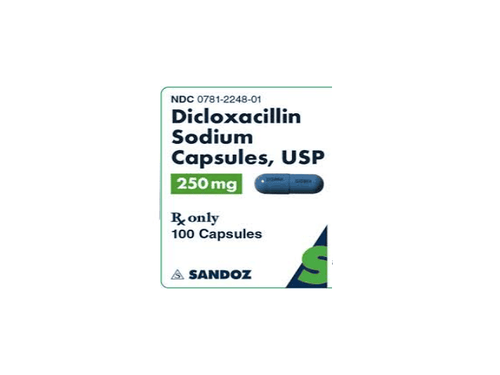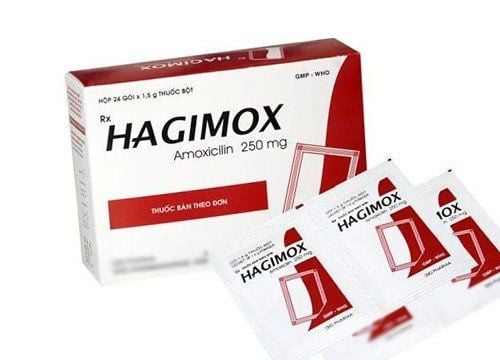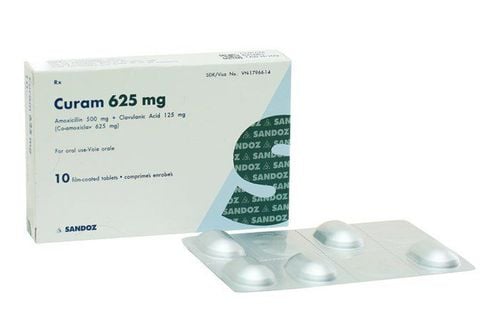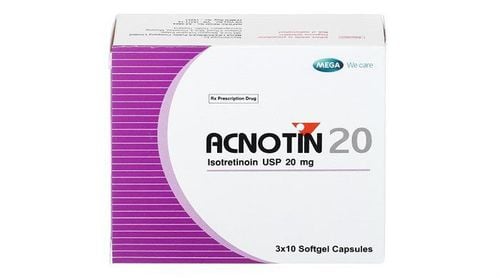This is an automatically translated article.
Doxycycline hyclate is an antibiotic that fights infections. This is a drug with a broad spectrum of action, used in the case of infections on many different organs.1. What is Doxycycline hyclate 100mg?
Doxycycline hyclate 100 mg has the same composition as Doxycycline 100mg and Doxycycline hyclate 50mg has the same composition as Doxycycline 50mg. Prepared in capsule form.
Doxycycline is a broad-spectrum antibiotic, with bacteriostatic effect against aerobic and anaerobic bacteria, Gram-positive and Gram-negative bacteria, some resistant microorganisms acting on the cell wall (group) beta lactam) such as Rickettsia, Coxiella burnetii, Chlamydia spp...
Mechanism of action of Doxycycline is an inhibitor of bacterial protein synthesis by binding to the 30s subunit and possibly to the 50s of the ribosomes of susceptible bacteria. sensitive to this antibiotic. The drug can also cause some changes in the plasma membrane.
2. What are the uses of Doxycycline hyclate 100mg?
Thanks to its bacteriostatic effect and broad spectrum of action, the drug is effective in the following cases:
Bronchitis, pneumonia, lobar pneumonia caused by sensitive bacteria Pneumococcus (pneumococcal), Streptococcus, Staphylococcus staphylococci), Haemophilus influenzae; Upper respiratory tract infections such as pharyngitis, tonsillitis, rhinosinusitis, otitis media caused by bacteria such as group A hemolytic streptococci, Staphylococcus, Pneumococcus, Haemophilus influenzae; Urinary tract infections: pyelonephritis, cystitis, urethritis caused by strains of bacteria group Klebsiella aerobacter, E. coli, Enterococcus, Staphylococcus (staphylococci), Streptococcus; Skin and soft tissue infections such as: Impetigo, boils, cellulitis, acne, soft tissue abscesses, wound infections, bacterial infections caused by Staphylococcus aureus and albus. Streptococcus, E.coli and Klebsiella aerobacter group; Gastrointestinal infections caused by Shigella, Salmonella (typhoid) and E.coli. Note that Doxicycline hyclate should not be used in the following cases:
Hypersensitivity to tetracycline drugs or components in the drug; Hypersensitivity to anesthetics such as Lidocaine, Procaine; Not for use by pregnant and lactating women; Children under 8 years old due to affecting the development of children's bones and tooth enamel; The patient has severe liver failure.
3. Usage and dosage of Doxicycline hyclate
How to use: Should be taken during or after meals with plenty of water. Take the medicine in an upright position, to avoid the risk of esophageal ulcers or to reduce irritation of the gastrointestinal tract.
Dosage in adults:
Single loading dose of 2 Doxicycline hyclate 100mg tablets on the first day of treatment, followed by a maintenance dose of 1 tablet once daily at the same time of day; Severe infections: Adult dose 200mg/time/day during treatment; Treatment of acute gonococcal infection: Take 2 tablets of Doxicycline hyclate 100mg at the beginning and 1 tablet at night before bed on the first day, then 1 tablet x 2 times/day for the next 3 days; Treatment of uncomplicated urethral infections, cervical or vaginal infections: 100mg x 2 times/day for a minimum of 10 days. Children over 8 years old: Dosage is 4mg/kg/day, administered once a day.
Children when used to treat Streptococcus infections (group A beta-hemolytic streptococcus) should be treated continuously for 10 days to prevent rheumatic fever or acute glomerulonephritis after streptococcal infection. There is no need to reduce the dose of the drug in patients with renal failure, the elderly. Patients with liver failure need to change the dose accordingly.
4. Doxycycline hyclate side effects
Like other broad-spectrum antibiotics, when taking the drug you may experience some side effects, including:
Digestive disorders such as nausea and vomiting, diarrhea, glossitis, stomatitis and proctitis may occur during treatment with doxycycline but rarely requires discontinuation of therapy; There have been very rare reports of esophagitis when this drug is taken in capsule form; As with other tetracyclines, some conditions have been reported with this class of drugs including elevation of liver enzymes such as SGOT (AST) or SGPT (ALT), anemia, neutropenia, eosinophilia, decreased pancytopenia or an increase in BUN (a test that measures the amount of urea nitrogen in the blood). When seeing serious side effects, it is necessary to notify or go to a medical facility immediately for timely treatment.
5. Precautions when taking Doxycycline Inform your doctor about any history of allergy to the drug or other drugs of the same class. Medical condition and drug use should be carefully considered before using Doxycycline hyclate; Avoid long-term use of Doxycycline hyclate because it can cause superinfection with fungi or other microorganisms. Use exactly as prescribed and do not stop when the dose is not enough because of the risk of drug resistance; Avoid prolonged sun exposure while taking this medication because of possible photosensitivity. Protective measures such as wearing long-sleeved shirts, wide-brimmed hats should be used to reduce sun exposure and use sunscreen when outdoors; The drug should not be used in pregnant and lactating women because Doxycycline can form a complex with stable calcium in tissues of a bone nature. Although in vitro, Doxycycline is less bound to calcium than other tetracyclines. But to date has not been observed in clinical studies, therefore doxycycline should be avoided during tooth development (last 3 months of pregnancy, lactation, infancy and childhood). ) as it can stain teeth. Although more common with prolonged use, this side effect has also occurred with short-term use of tetracyclines. Drug interactions may occur when Doxycycline is used concurrently with:
Antacids containing aluminum, calcium or magnesium may reduce the effectiveness of Doxycycline; Iron, Bismuth may reduce the effect of Doxycycline.; Barbiturates, Phenytoin, Carbamazepine may accelerate the elimination of Doxycycline, reduce plasma concentrations earlier than normal; Anticoagulant Warfarin may increase the effect of anticoagulants, increasing the risk of blood clots. Note that when an overdose occurs, symptoms such as nausea, vomiting, and diarrhea may occur. If a drug overdose occurs as recommended, you should immediately go to the nearest medical facility so that the medical staff can have the earliest treatment method.
Do not use the medicine past the expiry date and always check the expiration date before taking the medicine.
Doxycycline hyclate is an antibiotic used in some infections. Especially often prescribed in the treatment of acne. You should only take Doxycycline hyclate when prescribed by your doctor to be on the safe side.
Please dial HOTLINE for more information or register for an appointment HERE. Download MyVinmec app to make appointments faster and to manage your bookings easily.













